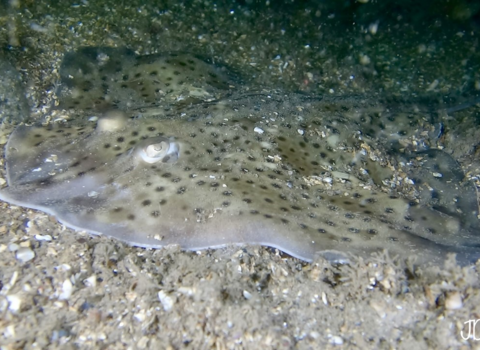
JD Scuba
Spotted ray
The spotted ray is one of the smallest species of skate, growing to only 80 cm.
Scientific name
Raja montaguiWhen to see
Present all year roundTop facts
Stats
Length: Up to 80 cmWeight: Up to 4.5 kg
The spotted ray is listed as Least Concern by the IUCN Red List.
About
The diamond-shaped spotted ray is one of the smallest skate species. It has a varied diet, eating crustaceans, worms and fish. The young often live in shallow areas near the coastline, known as nursery grounds, but adults are typically found further offshore.Spotted rays are able to reproduce more quickly than some of the other skates, making them less vulnerable to overfishing.
Although it is commonly called the spotted ray, it is actually a species of skate (sometimes known as the spotted skate). Skates and rays are closely related and look similar, but you can spot the difference by looking at the tail. Skates have a short tail with small fins and no stinging capabilities, whereas rays have a long whip-like tail.
What to look for
The spotted ray has numerous dark spots all over its back, except for on the edge of its wings, and sometimes an eyespot is present on each wing.It can be mistaken for the blonde ray, but there is an easy way to tell them apart! The spotted pattern on the spotted ray's back does not extend all the way to the very edge of its wings, leaving a plain brown/yellow edge.
